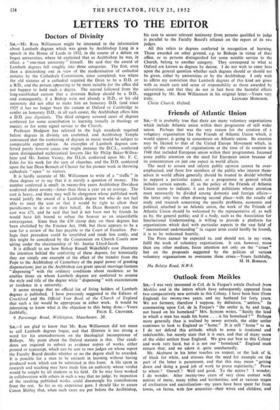Sue,-1 am glad to know that Mr. Ross Williamson did
not mean to call Lambeth degrees bogus, and that illiterate is too strong a- word for his animadversions on the theological incompetence of Bishops. My point about the Oxford statutes is this. Our candi- dates are required to submit as evidence copies of works, either printed or typescript, which can be sent to two judges on whose report the Faculty Board decides whether or no the degree shall be awarded. It is possible for a man to be eminent in learning without having produced work which can be submitted in this form. A life spent in research and teaching may have made him an authority whose verdict would be sought by all students in his field. Or he may have worked in collaboration with others in such a way that no judge, by inspection of the resulting published works, could disentangle his contributions from the rest. So far as my experience goes, I should like to assure Canon Shirley that, when such cases are put before the Archbishop, his care to secure relevant testimony from persons qualified to judge is parallel to the Faculty Board's reliance on the report of its two judges.
All this refers to degrees conferred in recognition of learning. Those awarded on other ground, e.g. to Bishops in virtue of their office, or to persons distinguished for some notable service to the Church, belong to another category. They correspond to what at Oxford are known as degrees by decree. I do not wish to enter here upon the general question whether such degrees should or should not be given, either by universities or by the Archbishop. I only wish to affirm my conviction that Lambeth degrees of this kind are given with as much care and sense of responsibility as those awarded by universities, and that they do not in fact have the harmful effects suggested by Mr. Ross Williamson in his original letter.—Yours very


































 Previous page
Previous page